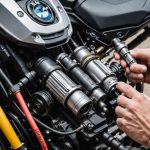Overview of Nitrogen-Filled Tires
Choosing nitrogen-filled tires as an inflation option offers distinct advantages over traditional air-filled tires. The use of nitrogen can significantly enhance tire performance. This is particularly important for British sports cars, where precision and reliability are paramount.
Nitrogen, as an inflation medium, is known for its reduced tendency to escape through the tire walls compared to regular air, thanks to its larger molecular size. This means nitrogen-filled tires maintain pressure longer, leading to more consistent tire performance. For British sports cars, which demand optimal handling and efficiency, such stability contributes to enhanced dynamics on the road.
Additional reading : Top Strategies to Minimize Interior Vibrations in Luxury British Automobiles
In comparison, regular air consists of approximately 78% nitrogen, 21% oxygen, and trace gases. Oxygen can permeate through the tire more rapidly than nitrogen, potentially leading to fluctuating tire pressure. Fluctuating tire pressure in performance vehicles can affect grip, braking, and fuel economy.
Additionally, nitrogen’s inert nature limits moisture accumulation within the tire. Inhibiting moisture can mitigate corrosion risks to the tire’s internal components and the wheel itself. Thus, the benefits of nitrogen in tires are not limited to performance but extend to long-term durability and safety, making it an appealing choice for those who prioritize consistent tire inflation.
This might interest you : Discover the exciting porsche gt3 rs apparel collection
Performance Benefits
When considering tire performance, integrating nitrogen-filled tires offers notable advancements. One primary benefit is improved pressure stability. Unlike regular air, nitrogen exerts less pressure fluctuation due to temperature changes, leading to more consistent performance. This stability significantly impacts handling, especially in sports cars where precision is paramount. The steady pressure ensures that tires maintain their optimal shape and contact with the road, enhancing both safety and agility.
Temperature management plays a crucial role in tire performance, particularly under high-speed conditions. Nitrogen, being less susceptible to temperature-induced expansion and contraction, helps maintain stable pressures even when a vehicle hits high speeds. This not only preserves the integrity of the tire but also contributes to a smoother and more controlled ride.
For sports car enthusiasts, the benefits are clear. With nitrogen-filled tires, drivers can better exploit their vehicle’s handling capabilities. The superior pressure stability and temperature management translate to more predictable handling responses and improved tire performance. Thus, nitrogen inflation isn’t just about maintaining pressure; it’s about ensuring that your vehicle performs optimally in varied driving conditions, offering a premium experience for drivers seeking precision and reliability.
Longevity and Durability
The longevity of a tire significantly relies on its ability to resist oxidation and moisture absorption, which are critical factors leading to wear. Traditional air-filling methods often involve oxygen, which causes oxidation. This process deteriorates the rubber, reducing the tire’s lifespan. Using nitrogen in tires, however, drastically cuts down on oxidation, preserving the tire’s integrity.
How Nitrogen Contributes to Tire Lifespan
Nitrogen is less reactive with the metal alloys typically used in tire construction compared to oxygen. This chemical stability helps maintain tire longevity by minimizing internal pressure variations, leading to less wear and tear. Reduced moisture levels in nitrogen-filled tires also mean that the rubber doesn’t absorb moisture, which tends to soften and weaken over time.
Maintenance Implications for Sports Car Enthusiasts
For sports car enthusiasts, maintaining a high-performance vehicle demands more attention. Regularly inspecting wear resistance becomes paramount as these vehicles often face extreme operational conditions. Nitrogen-filled tires not only extend the time between fill-ups but also ensure a consistent tire pressure, contributing to optimal performance. This reduced maintenance stress allows enthusiasts to focus on enjoying their drive rather than worrying about premature tire wear.
Cost Implications
Investing in nitrogen tires can raise questions regarding cost. Let’s delve into these financial aspects, starting with the initial costs compared to regular air inflation. Filling tires with nitrogen typically incurs a higher upfront expense. However, the rationale behind this investment is rooted in the long-term benefits and savings.
Over time, nitrogen tires tend to maintain pressure more consistently, potentially leading to an increased overall tire lifespan. Drivers may see fewer needs for tire replacements, which directly impacts long-term savings. This becomes particularly relevant for those driving sports cars, where tire performance and longevity are critical in enhancing the vehicle’s value and driving experience.
From a financial perspective, a cost-benefit analysis can highlight whether this investment is suitable. For sports car enthusiasts, the prolonged lifespan and improved pressure stability can justify the initial inflation cost. Hence, engaging in this practice may represent a savvy economic choice, especially for those seeking to optimise performance.
In summary, while the initial outlay for nitrogen inflation is generally higher, the extended benefits could make it a worthwhile investment for certain drivers, resulting in seen and unseen savings over time.
User Experiences and Testimonials
Exploring real-world experiences of sports car owners using nitrogen-filled tyres offers valuable insights into its performance benefits. Many users report enhanced driving experiences, attributing smoother rides and improved handling to nitrogen usage. These user testimonials reflect a recurring theme: nitrogen’s ability to maintain consistent tyre pressure over time, leading to performance improvements.
Anecdotal evidence supports the claim that nitrogen contributes to a noticeable difference during high-speed driving, an essential aspect for sports car enthusiasts. Several owners shared instances where their vehicles performed exceptionally well even in challenging conditions, highlighting nitrogen’s practical advantage. These personal observations are backed by case studies illustrating similar performance feedback.
Experts in automotive performance frequently advocate for nitrogen-filled tyres, citing its benefits in maintaining optimal tire health and longevity. Their opinions often emphasise the reduced risk of tyre pressure fluctuations, which is crucial for maintaining safety and efficiency.
One enthusiast noted, “Switching to nitrogen had an immediate impact on my car’s stability and handling.” Such testimonials are influential, providing a compelling case for nitrogen’s practical use in everyday driving scenarios. As these experiences accumulate, they form a solid case for considering nitrogen as a preferred option for tyre inflation.
Considerations for British Sports Cars
British sports cars, known for their unique styling and performance, require meticulous attention, particularly when it comes to tire specifications. A critical aspect of maintaining these high-performance vehicles is selecting the appropriate tire inflation method. The correct choice ensures optimal handling and safety, especially given the varied driving conditions across the UK.
Understanding the specific requirements of British sports cars in terms of tire pressure is vital. These cars often demand precise tire pressure to perform at their best. Incorrect pressure can affect not just performance, but also safety and fuel efficiency. Therefore, it’s essential for owners to regularly check and adjust tire pressures to match the manufacturer’s guidelines, ensuring the car stays in peak condition.
Driving conditions in Britain can vary greatly, from smooth urban roads to more rugged rural landscapes. This variability necessitates tailored recommendations for tire care. In regions with harsher road conditions or frequent weather changes, tires may require more frequent inspections and maintenance routines.
In summary, maintaining the right tire pressure and care for British sports cars not only upholds their performance but also enhances their longevity, adjusting according to the regional and seasonal conditions they face.











